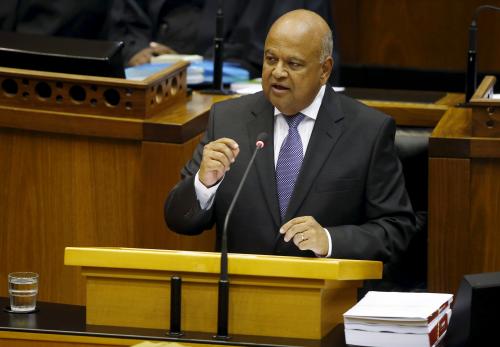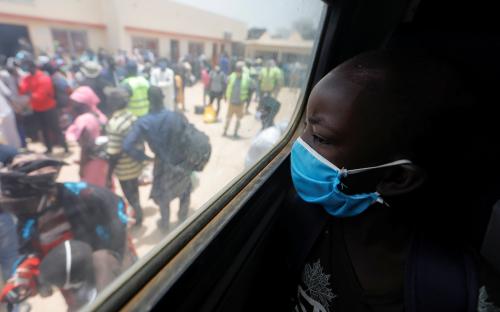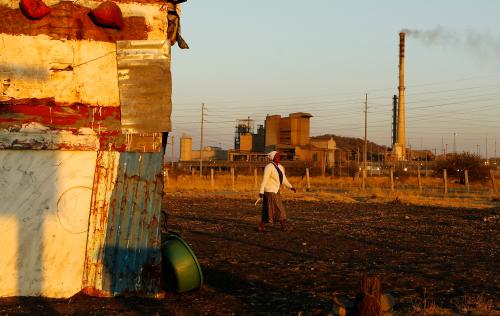At a time of decelerating regional growth in sub-Saharan Africa, South Africa—one of the continent’s leading economies—is facing the brunt of concurrent external and domestic growth shocks. During a Brookings event on April 14, 2016 moderated by Africa Growth Initiative Director Amadou Sy, South African minister of finance, the Honorable Pravin Gordhan, provided cause for encouragement, as he highlighted strategies that South Africa is implementing to reverse slowing growth trends, boost social cohesion, and springboard inclusive, sustainable development.
Throughout the event, Minister Gordhan emphasized that South Africa is refocusing its efforts on implementing homegrown policies to mitigate the effects of global and domestic shocks: “Our approach is not to keep pointing outside our borders and say, ‘That’s where the problem is.’ We’ve got our own challenges and difficulties, and potential and opportunities. And it’s important to focus on those, and rally South Africans behind that set of initiatives so that we could go wherever we can in terms improving the situation.”
He began by explaining the major growth problems facing South Africa, including first-level structural challenges—consistent electricity supply and labor relations—as well as deeper structural challenges, for instance, reforming the oligopolistic sectors of its economy. To address these issues, he expanded on what collaborative, multi-stakeholder efforts would be necessary. Watch:
Contending with infrastructure needs—particularly energy and logistical, but also social, such as water and sanitation, health care, and educational facilities—will play a significant role in overcoming these aforementioned challenges. Minister Gordhan explained how the government aims to fill existing infrastructure gaps through innovative financing mechanisms. Watch:
Later in the event, Sy pressed Minister Gordhan on plans for implementation for the country’s ambitious goals. As an example, Minister Gordhan underlined “Operation Phakisa,” a results-driven approach to fast-track the implementation of initiatives to achieve development objectives. The government intends to use this methodology to address a number of social priorities, including unlocking the potential of South Africa’s coastlines and oceans. Watch:
Urbanization in South Africa and sub-Saharan Africa as a whole is widespread and increasing, creating a demand for governments to both maintain their infrastructure as well as harness their energy and human capacity. Cities, especially those in South Africa’s Gauteng Province (Johannesburg, Pretoria, and Ekurhuleni), will continue to be crucial engines of economic development if municipal governance systems effectively manage the region’s expected rapid urbanization in the years to come. Minister Gordhan discusses some of the lessons learned from the Gauteng city region. Watch:
In sum, referring to the confluence of adverse global conditions and internal problems currently affecting South Africa, Minister Gordhan stated, “Whenever you are in the middle of a storm it looks like the worst thing possible—but storms don’t last forever.” He did not doubt the ability of the South African people to weather and emerge stronger from the storm, offering: “Ultimately South Africans are hopeful, are optimistic and resilient.”
You can watch the full event
here
.






Commentary
WATCH: South African Finance Minister Pravin Gordhan on the country’s challenges, potential, and resilience
May 5, 2016